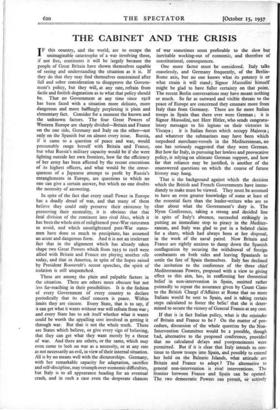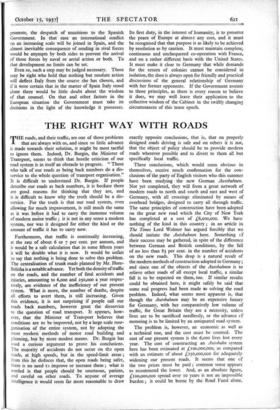THE CABINET AND THE CRISIS
I F this country, and the world, are to escape the unimaginable catastrophe of a war involving three, if not five, continents it will be largely because the people of Great Britain have shown themselves capable of seeing and understanding the situation as it is. If they do that they may find themselves constrained after full and sober consideration to disapprove the Govern- ment's policy, but they will, at any rate, refrain from facile and foolish dogmatism as to what that policy should be. That no Government at any time since 1918 has been faced with a situation more delicate, more dangerous and more bafflingly perplexing is plain and elementary fact. Consider for a moment the known and the unknown factors. The four Great Powers of Western Europe are sharply divided—Britain and France on the one side, Germany and Italy on the other—not only on the Spanish but on almost every issue. Russia, if it came to a question of peace and war, would presumably range herself with Britain and France, but what Russia's military capacity would be if she were fighting outside her own frontiers, how far the efficiency of her army has been affected by the recent executions of its highest officers, and what would be the conse- quences of a Japanese attempt to profit by Russia's entanglements in Europe, are questions to which no one can give a certain answer, but which no one doubts the necessity of answering.
In spite of the fact that every small Power in Europe has a deadly dread of war, and that many of them believe they could only preserve their existence by preserving their neutrality, it is obvious that that fatal division of the continent into rival blocs, which it has been the whole aim of enlightened post-War statesmen to avoid, and which unenlightened post-War states- men have done so much to precipitate, has assumed an acute and dangerous form. And it is not an irrelevant fact that in the alignment which has already taken shape two Great Powers which from 1915 to 1918 were allied with Britain and France are playing another role today, and that in America, in spite of the hopes raised by President Roosevelt's recent speeches, the spirit of isolation is still unquenched.
These are among the plain and palpable factors in the situation. There are others more obscure but not less far-reaching in their possibilities. It is the fashion of every Government of every country to declare periodically that its chief concern is peace. Within limits they are sincere. Every State, that is to say, if it can get what it wants without war will refrain from war ; and every State has to ask itself whether what it wants could be worth the appalling cost involved in getting it through war. But that is not the whole truth. There are States which believe, or give every sign of believing, that they can get what they want merely by a threat of war. And there are others, or the same, which may even come to look on war as a necessity, or at any rate as not necessarily an evil, in view of their internal situation. All is by no means well with the dictatorships. Germany, with her remarkable capacity for adaptation, sacrifice and self-discipline, may triumph over economic difficulties, but Italy is to all appearance heading for an eventual crash, and in such a case even the desperate chances of war sometimes seem preferable to the slow but inevitable working-out of economic, and therefore of constitutional, consequences.
One more factor must be considered. Italy talks ceaselessly, and Germany frequently, of the Berlin- Rome axis, but no one knows what its potency is or what strain it will stand; Signor Mussolini himself might be glad to have fuller certainty on that point.
The recent Berlin conversations may have meant nothing or much. So far as outward and visible threats to the peace of Europe are concerned they emanate more from Italy than from Germany. There are far more Italian troops in Spain than there ever were German ; it is Signor Mussolini, not Herr Hitler, who sends congratu- latory messages to his legions on their victories in Viscaya ; it is Italian forces which occupy Majorca ; and whatever the submarines may have been which torpedoed merchant-vessels in the Mediterranean, no one has seriously suggested that they were German. But how far Italy, in pursuing her lawless and provocative policy, is relying on ultimate German support, and how far that reliance may be justified, is another of the unanswered questions on which the course of future history may hang.
That is the background against which the decision which the British and French Governments have imme- diately to make must be viewed. They must be assumed to have an even greater knowledge of some at least of the essential facts than the leader-writers who are so clear about what the Government's duty is. The Nyon Conference, taking a strong and decided line in spite of Italy's absence, succeeded strikingly in putting an immediate stop to piracy in the Mediter- ranean, and Italy was glad to put in a belated claim for a share, which had always been at her disposal, in the work of the naval patrol. Now Britain and France are rightly anxious to damp down the Spanish conflagration by securing the withdrawal of foreign combatants on both sides and leaving Spaniards to settle the fate of Spain themselves. Italy has declined the invitation to the conference of the three chief Mediterranean Powers, proposed with a view to giving effect to this aim, has, in reaffirming her theoretical belief in non-intervention in Spain, omitted rather pointedly to repeat the assurance given by Count Giallo to the British Charge d'Affaires at Rome that no more Italians would be sent to Spain, and is taking certain steps calculated to foster the belief that she is deter- mined to secure the victory of General Franco at any cost.
If that is in fact Italian policy, what is the rejoinder of Britain and France to be ? On the matter of pro- cedure, discussion of the whole question by the Non- Intervention Committee would be a possible, though bad, alternative to the proposed conference, provided that no calculated delays and postponements were permitted. But if it is clear that Italy intends to con- tinue to throw troops into Spain, and possibly to extend her hold on the Balearic Islands, what attitude are Britain and France to adopt ? The alternative to general non-intervention is rival interventions. The frontier between France and Spain can be opened. The two democratic Powers can permit, or actively promote, the despatch of munitions to the Spanish Government. In that ease an international conflict on an increasing scale will be joined in Spain, and the almost inevitable consequence of sending in rival forces would be attempts by both sides to prevent the arrival of those forces by naval or aerial action or both. To that development no limits can be set.
Even so, such a step may be judged necessary. Those may be right who hold that nothing but resolute action will deflect Italy from the course she has chosen, and if it were certain that in the matter of Spain Italy stood alone there would be little doubt about the wisdom of that counsel. On that and other factors in the European situation the Government must take its decisions in the light of the knowledge it possesses. Its first duty, in the interest of humanity, is to preserve the peace of Europe at almost any cost, and it must be recognised that that purpose is as likely to be achieved by resolution as by caution. It must maintain complete, continuous and unchequered co-operation with France, and on a rather different basis with the United States. It must make it clear to Germany that while demands for the return of colonies cannot be considered in isolation, the door is always open for friendly and practical discussions of the general relationship of Germany with her former opponents. If the Government assents to those principles, as there is every reason to believe it does, we may well leave their application to the collective wisdom of the Cabinet in the swiftly changing circumstances of this tense epoch.























































 Previous page
Previous page